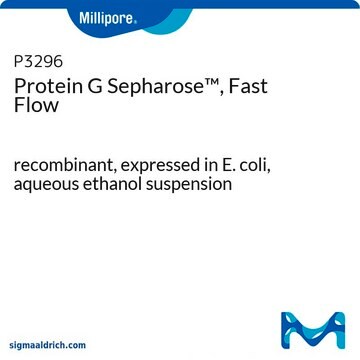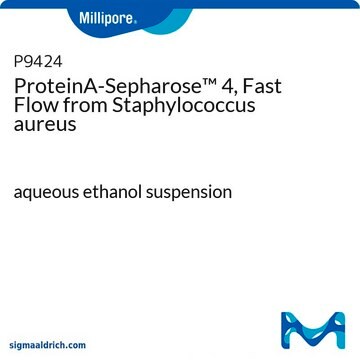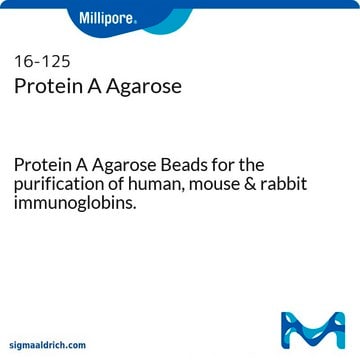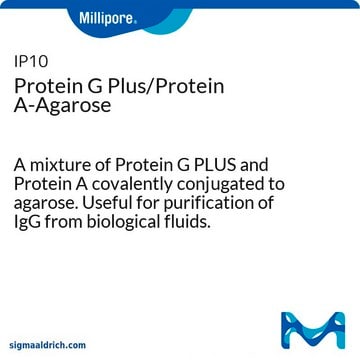16-266
Protein G Agarose, Fast Flow
Protein G Agarose, Fast Flow suitable for medium and low pressure chromatography of IgG from mouse, sheep, and rabbit, and for immunoprecipitations.
Synonyma:
Protein G resin
Přihlásitk zobrazení cen stanovených pro organizaci a smluvních cen
About This Item
UNSPSC Code:
41116133
eCl@ss:
32160801
NACRES:
NA.56
Doporučené produkty
form
liquid
manufacturer/tradename
Upstate®
technique(s)
affinity chromatography: suitable
immunoprecipitation (IP): suitable
western blot: suitable
shipped in
wet ice
General description
Fast flow agarose comprises highly crosslinked agarose beads or gels that can tolerate high pressures compared to standard agarose bead resins. Thus, these resins are ideal for fast protein liquid chromatography (FPLC) purification methods. They are preferred for medium to large-scale antibody purification. This product contains protein G covalently coupled by cyanogen bromide to highly cross-linked 4% agarose beads. It is stable in all aqueous buffers used in protein G chromatography.
Application
Protein G Agarose, Fast Flow has been used in immunoprecipitation. It is also suitable for medium and low-pressure chromatography of IgG from mice, sheep, and rabbits.
Quality
routinely evaluated by immunoprecipitation and purification
Physical form
water containing 20% ethanol
Storage and Stability
1 year at 4°C
Legal Information
UPSTATE is a registered trademark of Merck KGaA, Darmstadt, Germany
Disclaimer
Unless otherwise stated in our catalog or other company documentation accompanying the product(s), our products are intended for research use only and are not to be used for any other purpose, which includes but is not limited to, unauthorized commercial uses, in vitro diagnostic uses, ex vivo or in vivo therapeutic uses or any type of consumption or application to humans or animals.
signalword
Warning
hcodes
Hazard Classifications
Flam. Liq. 3
Storage Class
3 - Flammable liquids
wgk_germany
WGK 1
flash_point_f
116.6 °F
flash_point_c
47 °C
Osvědčení o analýze (COA)
Vyhledejte osvědčení Osvědčení o analýze (COA) zadáním čísla šarže/dávky těchto produktů. Čísla šarže a dávky lze nalézt na štítku produktu za slovy „Lot“ nebo „Batch“.
Již tento produkt vlastníte?
Dokumenty související s produkty, které jste v minulosti zakoupili, byly za účelem usnadnění shromážděny ve vaší Knihovně dokumentů.
Zákazníci si také prohlíželi
Boshi Wang et al.
EBioMedicine, 41, 320-332 (2019-02-13)
Hyper-activation of TGF-β signaling is critically involved in progression of hepatocellular carcinoma (HCC). However, the events that contribute to the dysregulation of TGF-β pathway in HCC, especially at the post-translational level, are not well understood. Associations of deubiquitinase POH1 with
Carsten Juel
PloS one, 9(10), e110514-e110514 (2014-10-14)
Changes in ion distribution across skeletal muscle membranes during muscle activity affect excitability and may impair force development. These changes are counteracted by the Na,K-ATPase. Regulation of the Na,K-ATPase is therefore important for skeletal muscle function. The present study investigated
Jie Hu et al.
FEBS letters, 592(11), 1893-1904 (2018-05-22)
SAMHD1 inhibits Hepatitis B virus (HBV) replication by reducing the intracellular dNTP levels. However, how SAMHD1 phosphorylation is regulated to abrogate its restriction of HBV replication in hepatoma cells is poorly understood. Here, we show that HBV replication and SAMHD1
Carsten Juel et al.
Physiological reports, 3(8) (2015-08-25)
Potassium and sodium displacements across the skeletal muscle membrane during exercise may cause fatigue and are in part controlled by the Na,K-ATPase. Regulation of the Na,K-ATPase is therefore important for muscle functioning. We investigated the effect of oxidative stress (glutathionylation)
Lijing Liu et al.
The Plant journal : for cell and molecular biology, 61(5), 893-903 (2009-12-18)
The ubiquitination proteasome pathway has been demonstrated to regulate all plant developmental and signaling processes. E3 ligase/substrate-specific interactions and ubiquitination play important roles in this pathway. However, due to technical limitations only a few instances of E3 ligase-substrate binding and
Náš tým vědeckých pracovníků má zkušenosti ve všech oblastech výzkumu, včetně přírodních věd, materiálových věd, chemické syntézy, chromatografie, analytiky a mnoha dalších..
Obraťte se na technický servis.












